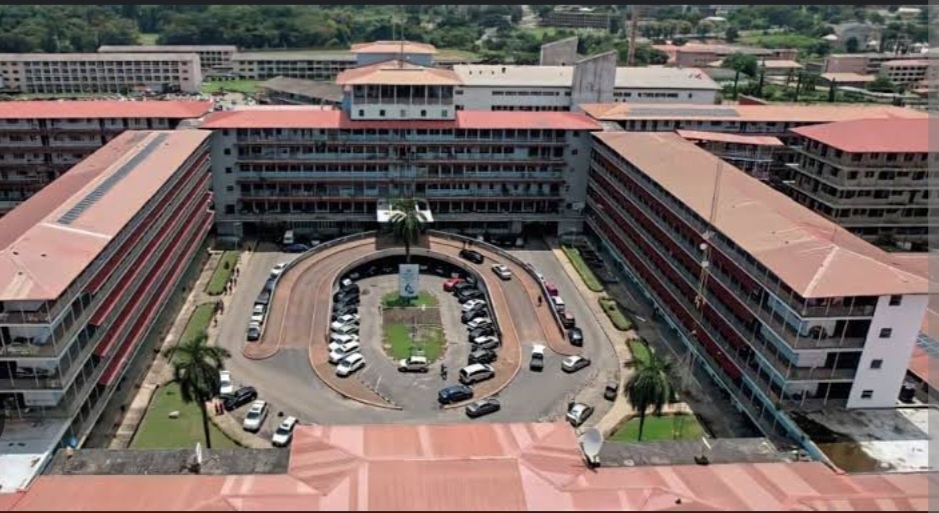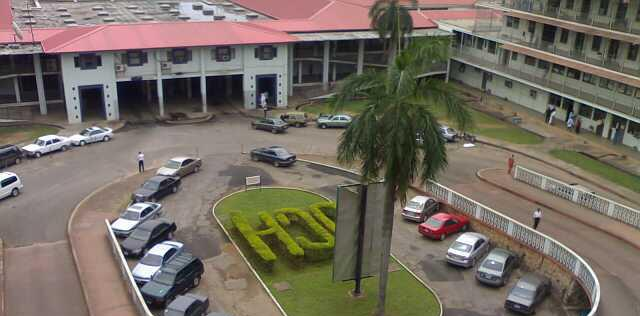Doctors at the University College Hospital (UCH), Ibadan, Oyo State, used phone lights to perform a surgery and transferred an expectant patient in need of surgical intervention to a private hospital amid a month-long outage, FIJ has learnt.
In late February, news made the rounds that the Ibadan Electricity Distribution Company (IBEDC) had decided to stop supplying power to UCH over an unpaid N500 million electricity bill.
During the period, Dr. Jesse Otegbayo, the hospital’s chief medical director, confirmed that power supply to the hospital had been disconnected but did not disclose the reasons for the development.
IBEDC subsequently claimed to have written UCH more than four times to clear its debt but to no avail.
Since then, officials at the 67-year-old hospital have been running services without power.

The power disconnection issue is beginning to take a heavy toll on the institution’s patients, their family members and medical staff, as tragedies are now being recorded in their numbers.
FROM AN EXPECTANT MOTHER
Adenike Jonathan (not real name), a 35-year-old expectant mother at one of UCH’s lying-in wards, spoke to FIJ on the difficulties she and other women had faced at the hospital due to a lack of power supply.
“There has been no electricity or water supply since I got here three weeks ago,” Jonathan told FIJ on Wednesday.
“I was meant to undergo surgery long before now, but that has not happened because of the power outage.
“Since I got here, I have witnessed up to six cases of patients, especially expectant mothers, being told to go home and come back because of the same power issue in the hospital complex.
“Apart from that, I also have a heavily pregnant friend who was asked to come back next week for delivery. She was supposed to be admitted at the beginning of this week, but now, due to the situation on the ground, her admission has been shifted to next week.
“Right now, she is experiencing contractions from time to time, and there is no hope of her getting her baby delivered right here in UCH.”
DOCTORS PERFOMED A SURGERY WITH PHONE LIGHTS
Jonathan told FIJ how a team of doctors performed an emergency surgery on a pregnant woman with lights from their phones.
“Around 3.45 am today, a team of doctors had to perform an emergency surgery on a heavily pregnant woman,” Jonathan said.
“This led to the hospital management turning on the generator to aid the surgery. After a few hours, however, the generator went off while the surgery was still ongoing, and the doctors had to finish up on the woman with the lights from their phones.
“I have never seen anything like that before in my life. It is quite shocking.
“The toilets are messed up, and the nurses administer drugs to patients with lights from their phones at night.
“They also take patients’ vitals with the lights from their phones, and the entire place looks like a graveyard in the evenings.
“In the last five days, we have not had water. I have been taking my bath with bags of pure water. A bag of pure water now goes for N400. That is the amount I spend every day before I can have my bath.”
NO DIESEL, NO SURGERY

Another expectant mother, who asked not to be named, told FIJ of a recent incident at another lying-in ward at UCH.
“Last week, a pregnant woman who was already experiencing contractions needed to be operated upon urgently,” the patient said.
“Unfortunately, it was later made known that UCH had no diesel in one of the generators that could be used for the surgery. As a result, she was given a referral to a private hospital.
READ ALSO: TSA, Bureaucracy… Why 600 Health Workers Resigned From UCH in 2 Years
“When the lady and her family members got to the private hospital, they discovered they could not afford the bill. This then led to them taking her to a general hospital.
“As a result of all the stress the woman went through in her pregnant state, she became fatigued and tired, and lost the baby in the process.
“I’ve seen doctors perform vaginal deliveries with lights from their phones because of the power situation here. They have also performed caesarean sections with their phones.”
FATALITIES ARE BEING RECORDED
“As of last Saturday, six deaths had been recorded at the hospital’s intensive care unit (ICU) due to this same power issue,” a relative of one of the hospital’s patients, who also asked not to be named, told FIJ.
“The hospital keeps admitting new patients without finding a lasting solution to the power issue. Funny enough, most hospital treatments these days actually require adequate power supply.
“I have been struggling to understand how and why UCH’s management has chosen not to do anything to resolve the situation.
“They raise money internally but have refused to use the money to resolve the internal problem they have.
“We used to pay just N1,400 as fees that would cover bed space and other expenses. These expenses were calculated based on the number of days spent at the hospital.
“About 10 days ago, however, the hospital management decided to increase the fee to N4,000 per patient, and it has to be paid weekly. And we even no longer get quality service for the bills we’re being made to pay.
“At least, if they are not paying IBEDC the money they owe, they should be able to buy adequate diesel with the weekly payments we now make.”
IMMINENT STRIKE
While speaking to FIJ, one of UCH’s non-clinical staff, who also asked not to be named, said the hospital’s clinical and non-clinical staff members might embark on a strike if the issue was not resolved soon.
“I can confirm to you that the news is true. The hospital is indeed owing IBEDC hundreds of millions of naira in unpaid electricity bills,” the non-clinical staff member said.
“Most of the major places within the hospital are currently being run with the help of generators. The use of generators has, unfortunately, proved not to be sustainable.
“Diesel is now very expensive, and we now get to run services with little quantities. This means the hospital is, nowadays, almost always without power.
“A strike is imminent. We can no longer pump water; we have also been unable to do many other things since power was disconnected by IBEDC. We, I mean both clinical and non-clinical staff, are planning on embarking on a strike over the issue.
“The strike is likely to happen soon.”
UCH SPOKESPERSON’S RESPONSE
When FIJ first phoned Funmilayo Adetuyibi, UCH’s spokesperson, for comments on the matter on Wednesday, she told this reporter she was already preparing a press release and would send a copy to FIJ once she was done.
Below is the statement she later sent to FIJ:
“While we can say that we have outstanding bills to settle with the Ibadan Electricity Distribution Company (IBEDC), the hospital’s management has left no stone unturned in our proactive approach in making our teeming patients have access to adequate medical care at all times.”
“It is not true that the hospital has an accumulated bill of N495 million over the last three years. The outstanding bill, as at the assumption of office, was N241 million and the payment plan for defraying the outstanding and payment of current bills was maintained until the tariff was arbitrarily increased .
“On the current disconnections of power supply to the hospital, the management has had several meetings with the IBEDC management. A payment plan on how to offset the backlog of the outstanding debt has been forwarded to both the consultant of IBEDC and the regional head of IBEDC .This payment plan was rejected by IBEDC. They insisted on an immediate payment of N250 million.
“This Management’s catchphrase is “patient comfort and staff welfare”. The disconnection of power supply has become a challenge to water supply to the Hospital and other critical operational services.
“To put on record, the hospital has never spent N160 million on diesel on a monthly basis. We spend an average of 17 million per month on diesel, depending on power supply from IBEDC.
“Also, we have not experienced 24 hours of power supply in the hospital. The Internal Audit Department of the Hospital has a daily record of the electricity supplied to the hospital by IBEDC.
“The narrative of patients’ relations buying sachet water does not arise even though the hospital presently does not have optimal water supply due to power outage, we rely on the generators to pump water.
“The hospital has 45 generators. Out of these 45 generators, some are due for servicing while some are due for replacement. The hospital management has also made available solar inverter in some areas (all out-patients’ clinics, South East 3 ward, East 3 ward, South west 2 ward, Accident and Emergency Department, Endoscopy Suites, ECG Suites, South West 3 Ward(endowed by Abib Olamitoye Foundation), Staff Clinic, Owena Dialysis Ward, Medical Microbiology Department amongst others.
“As stated earlier, the contention we have with IBEDC is the outstanding bill.
“This year we have received a bill of N147 million. We paid N50 million in January 2024, N55 million in February 2024, and N45 million in March 2024, totalling N150 million Naira.
“We have appealed to the IBEDC on several occasions not to charge UCH on commercial rates because we render social services. But our appeals have not had the ears of the company.
“However, in order to mitigate the effect of power outages, the hospital has set up an energy committee charged with the responsibility of raising funds for the payment of electricity bills to have funds to provide solar powered energy to other service areas in the hospital. Aside from that, the energy committee is to find sustainable solutions to the Hospital energy problem.
“We plead to well-meaning individuals, corporate organisations, and the international community at large to come to the aid of the Hospital. The UCH is a national heritage, our collective legacy.”

